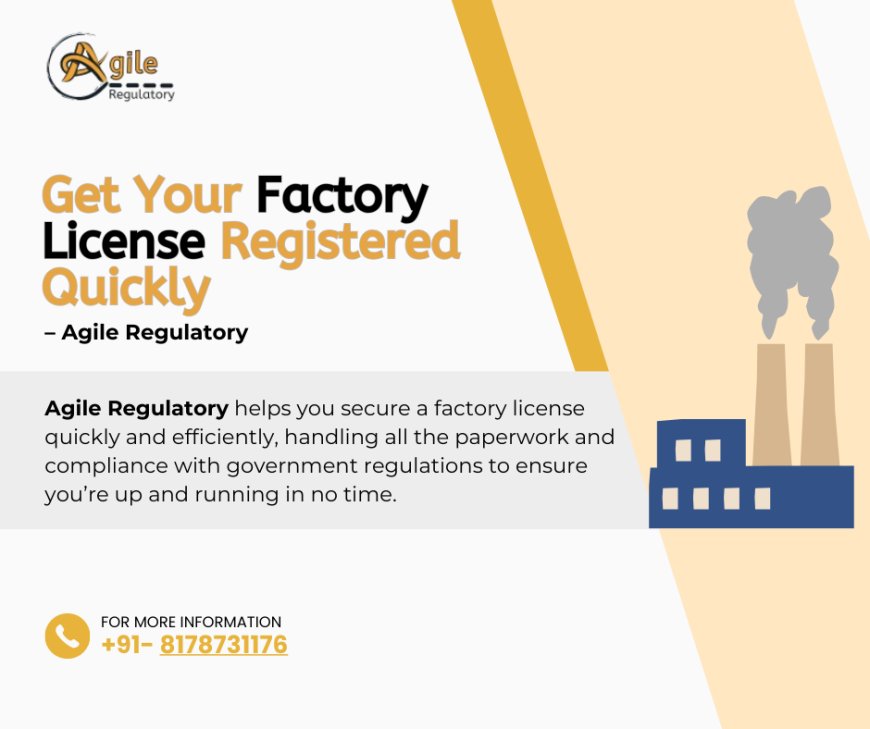Attracting Investment in Manufacturing: Demonstrating Regulatory Adherence to Potential Stakeholders.
India’s manufacturing sector has emerged as a global hub, driven by government initiatives like Make in India and PLI schemes. But while scale, location, and product innovation matter, one key factor that often determines investment success is regulatory compliance. For manufacturers, showcasing regulatory adherence is not merely about meeting legal obligations — it's a strategic move to build stakeholder trust, minimize risks, and unlock capital flow.

India’s manufacturing sector has emerged as a global hub, driven by government initiatives like Make in India and PLI schemes. But while scale, location, and product innovation matter, one key factor that often determines investment success is regulatory compliance. For manufacturers, showcasing regulatory adherence is not merely about meeting legal obligations — it's a strategic move to build stakeholder trust, minimize risks, and unlock capital flow.
Why Regulatory Compliance Matters to Investors
Investors evaluate manufacturing ventures not just on operational efficiency but also on their ability to manage long-term risks. Regulatory non-compliance — whether related to environmental norms, labor laws, quality standards, or industry certifications — can result in penalties, operational delays, and reputational damage. This makes due diligence on compliance frameworks an essential part of any investor assessment.
For instance, an export-driven unit lacking BIS certification for its electronic products or failing to comply with Extended Producer Responsibility (EPR) norms may not just lose market access but also face scrutiny from institutional investors. Compliance demonstrates that the business is structured, disciplined, and ready for scale — traits that directly influence investor confidence.
Aligning Regulatory Preparedness with Business Goals
To attract investment, manufacturers must integrate regulatory compliance into their growth strategy. This means proactively obtaining required certifications such as BIS, FSSAI, BEE, LMPC, and pollution control consents — not only to meet operational needs but to create an investor-ready framework.
Having clear documentation, renewal tracking systems, and updated approvals also indicates strong internal governance. For manufacturing startups or MSMEs seeking funding, being able to produce valid licenses and show regulatory alignment becomes a compelling value proposition during pitch rounds or due diligence.
The Role of Transparency and Readiness
Investors today favor companies that offer transparency in compliance status. Whether you're applying for a private equity round, bank loan, or foreign investment, providing clear visibility into your licensing, safety practices, and regulatory certifications builds credibility. A well-organized compliance tracker or a third-party audit report can serve as a tangible assurance of risk mitigation.
Additionally, sectors like food processing, medical devices, electronics, and chemicals require constant alignment with evolving regulations. Being up to date with new policies, amendments, and regional mandates can help businesses stay ahead and strengthen their investment appeal.
How Agile Regulatory Supports Compliance for Investment Readiness
Agile Regulatory has been a trusted partner to manufacturing businesses across India, helping them secure the licenses and certifications required to operate and grow. With expertise across BIS, EPR, LMPC, Pollution Board, Drug Licensing, and more, Agile Regulatory simplifies complex processes and ensures timely approvals. For companies preparing to attract investors, Agile Regulatory conducts compliance audits, manages renewal tracking, and helps create a structured compliance framework — all of which add significant value during funding rounds or partnerships. By handling end-to-end regulatory requirements, Agile Regulatory enables manufacturers to focus on operations while remaining fully compliant and investor-ready.
Conclusion
In today’s competitive and regulated business environment, demonstrating strong regulatory adherence is not optional — it’s a critical lever for attracting investment. By prioritizing compliance and partnering with experts like Agile Regulatory, manufacturing businesses can enhance transparency, reduce legal risk, and position themselves as credible, scalable ventures in the eyes of potential stakeholders.




































































